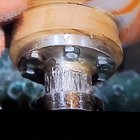I don't weld and based on cost, there are two types of homemade inexpensive faceplates that I make:
One is using a nut embedded in a piece of oak or equivalent hardwood. I measure from flat to flat of a hex bolt and drill that diameter hole into 2" oak stock. The minimum thickness of the wood is based on the nut width and your spindle length. I then chisel notches for hex bolts to fit. I epoxy the spaces to strengthen the joint between the nut and the hex hole that I carved out. It works very well. The difficulty was finding an inexpensive M33 -3.5 nuts for my Oneway. A 1 1/4 x 8 hex nut is not very common also. For what Fastenal and Granger charge, I can buy a faceplate company! Seek and ye shall find as they say. Here is a link for about $5 cost for 1 1/4 x 8 threaded nut.
https://www.fmwfasteners.com/collec.../products/1-1-4-8-a194-2h-heavy-hex-nut-plain
(Nutty.com seems more reasonable. That was posted while I was composing this)
The cost of a machine screw or a threaded rod, in M33, I never found reasonably priced. So for projects like a carving stand, I used 1 x 8 bolt and used an adapter to my chucks. Alternatively, You can use a 1 x8 nut and use an adapter as well for the faceplates. My club has all 1 x8 threading and when I am preparing blanks on my oneway for a club demo, I attached them to 1 x 8 homemade faceplates that are adapted to m33.
The adapter idea was thrown out there for all those having difficulty locating a nut that fits your spindle thread.
The second method I used in creating a faceplate was to buy a tap the same size as my spindle. The initial investment of about $30, can yield an endless supply of wooden faceplates. Like the above, I use my scrap hardwood for a free supply. I sometimes use 1/4" lag bolts to attach the work, but sometimes I may glue a valuable blank directly to the homemade, home tapped faceplate saving me 1/2"- 1" of stock without screw hole waste.
Here is one source for the tap:
It is important to note for safety: The larger your blank size, the more rigid your faceplate requirement will be to safely hole your work. All steel or cast iron faceplates may be preferred in these cases.


